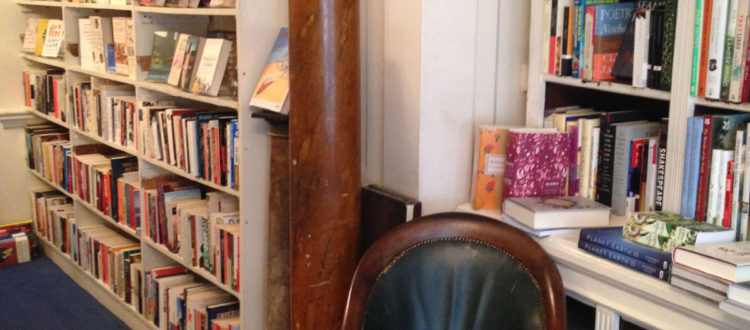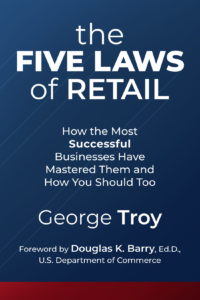How Two of London’s Iconic Bookstores Mastered the Five Laws of Retail RETAIL STORE WALK-THROUGH #2
One can discern a great deal about a store’s success or lack of same just by walking through the store and talking to people who are there, both customers and employees. In our last walk-through we learned a lot about why the Barnes & Noble bookstore chain is struggling. Inventory turn, product assortment, and other issues were all on display. Here we review two specialty bookstores in London that are thriving and discover why.
Mayfair’s Heywood Hill
Heywood Hill is a single-store operation in the Mayfair district of central London. It is a very, very bookish place. Narrow aisles thread through piles of books that are piled tables or on the floor; wall shelves up to the ceiling overflow with more. Employees work at desks scattered throughout and among the books. Well-worn leather chairs just beg to be sunk into with a book for the rest of the afternoon.
The store has been around for eighty years, and currently does just 25 percent of its volume through in-store sales; the rest is through its website. (They’ve been purchased by Waterstones, but in a wise decision rarely seen in corporations, corporate management left Nicky Dunne, chairman of Haywood Hill, to run his own operation.)
Heywood Hill has created a closely connected community between the store’s booksellers and its readers. The minute you walk into the place, you can feel the sense of humor and genuine joy from the people who work and shop there.
Heywood Hill has carved out a very unique service for their customers that takes the First Law of Retail, People First, to an extraordinary level. They learn what your preferences and interests are and address them personally. In this way they develop a personal relationship with each and every customer by learning and responding to their individual preferences. Say you like cookbooks, or P. G, Wodehouse, or mysteries, histories, gardening, or are building a library with some other focus. You can choose—for yourself or as a gift—a new book each month, ten per quarter, or any other interval. They individually select books for each of their customers and then send those books directly to the customers’ homes.
Right now Heywood Hill is running an anniversary contest. If you win, they will send you a new book each and every month, individually chosen to suit your particular reading taste, for the rest of your life. Go to their website and enter the contest.
Piccadilly’s Hatchards
Hatchards, on Piccadilly next to Fortnum and Mason, was founded by John Hatchard in 1797. It’s the oldest bookstore in the U.K. At five stories tall, it is much larger than Heyworth Hill but exhibits many of the same bookish-culture props, including comfortable chairs and couches where you could easily spend the afternoon.
Hatchards has an incredible assortment of books. They have mastered the Third Law of Retail, It’s Always the Product. The selection is focused and extensive. The emphasis is clearly on British authors and subjects. There’s a section on English Gardens and everything on British history ever written including the complete set by Winston Churchill. English murder mysteries abound, and they didn’t forget Rock and Roll with a signed documentary on the Rolling Stones. And of course there are many great picture books about the Royal Family. There are ample first editions and signed copies in many categories. What you won’t find are scented candles, puzzles, and stuffed animals.
Hatchards also offers book services for children in addition to their adult fiction and nonfiction selections. (Hatchards is owned by Waterstones as well. And again in a display of common sense, Waterstones’ management allows Hatchards to continue to execute its winning formula.) 220 years of retail success is hard to argue with.
How Independents Succeed where the Chains Do Not
These two bookstores have built well-deserved reputations and devoted client bases by doing a lot of things right. A walk-through reveals a couple of things that they very clearly excel at. Heywood Hill took the concept of People First to a whole new level by creating a unique, personal relationship with each and every one of their customers.
Hatchards aces the Third Law of Retail by offering a product assortment focused on all things British and English. Their selection is so extensive that, as we like to say in the retail industry, “If they don’t have it, you don’t want it.”
Independent bookstores are enjoying resurgence in popularity even while the big chain bookstores struggle. These are just two bookstores that have applied The Five Laws of Retail and reap the rewards for doing so.
Do you have a favorite bookstore? Maybe in your neighborhood, or one that you’d drive to in order to get what you want? Share in the comments what you see that works in that store. Or maybe you could find one, do a walk-through, and see if there’s a connection for you on a level that the chains just don’t offer. Don’t forget to let us know what you find!
In my next blog I’ll do a walk-through of another great London bookseller, Waterstones, which is a chain that seems to be thriving in a way that Barnes & Noble is not. We’ll learn what Five Laws they are executing correctly to be successful.
Who Is George Troy, and Why Does His Opinion Matter?
I’ve been leading great retail teams for decades, from department stores to specialty stores and big boxes. And now I consult and write for retailers of all kinds. And because I spent my career in retail merchandising, I discovered that there are Five Laws of Retail—specific rules that determine a company’s success or failure. The execution (or lack thereof) these Five Laws can often be determined through a “walk through” of a physical store. So these walk-throughs and the conclusions drawn are the result of having done them innumerable times across many consumer categories. For the Walk-Through series I’ve chosen to review retail companies where there is something interesting going on, and I think you’ll begin to see a pattern about what works and what doesn’t.















